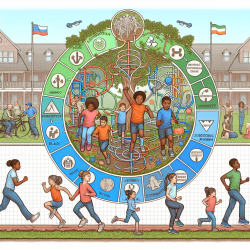Introduction
Childhood obesity is a significant public health issue in the United States, affecting approximately one-third of children. The research article "Understanding School-Aged Childhood Obesity of Body Mass Index: Application of the Social-Ecological Framework" by Noh and Min provides valuable insights into the factors contributing to childhood obesity. This blog aims to help practitioners improve their skills by implementing the outcomes of this research and encouraging further investigation.
Key Findings from the Research
The study utilized the 5th wave of the Fragile Families and Child Wellbeing Study, focusing on 9-year-old children. Key findings include:
- Black and Hispanic children are more likely to be obese/overweight than White children.
- Higher physical activity levels are negatively associated with obesity.
- Older mothers are more likely to have obese children.
- Family structure significantly impacts childhood obesity.
- School environment plays a crucial role in child obesity.
Implementing Research-Based Strategies
Practitioners can use these findings to develop targeted interventions. Here are some actionable strategies:
1. Promote Physical Activity
Encourage schools to increase physical education opportunities and build accessible recreation facilities. Physical activity helps reduce total body fat, increases muscle strength, and improves mental health.
2. Assess and Improve School Environments
Ensure that school environments are safe and pleasant. Address issues such as bullying and physical safety to reduce stressors that contribute to obesity.
3. Support Families
Provide resources and counseling to families, especially those with older mothers or unstable family structures. Educate parents on promoting a healthy lifestyle for their children.
4. Tailored Interventions for Minority Groups
Develop culturally appropriate interventions that consider the unique dietary and lifestyle factors of different racial/ethnic groups.
Encouraging Further Research
While the study provides valuable insights, further research is needed to explore additional factors such as eating habits and dynamic family structures. Practitioners should stay updated with the latest research to continually refine their approaches.
Conclusion
By implementing these research-based strategies, practitioners can significantly impact the fight against childhood obesity. Collaboration between schools, families, and communities is essential to create a healthier future for our children.
To read the original research paper, please follow this link: Understanding School-Aged Childhood Obesity of Body Mass Index: Application of the Social-Ecological Framework










